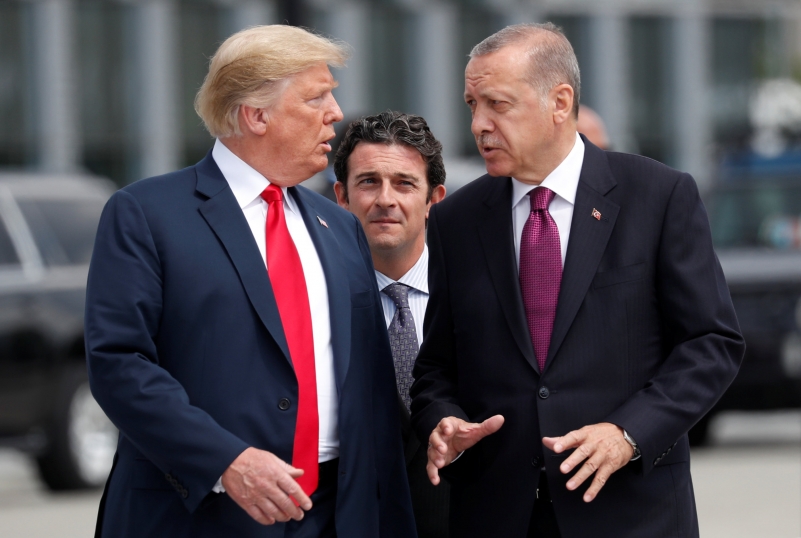How to save the US-Turkey relationship?
The current crisis between Ankara and Washington over the fate of the imprisoned American pastor Andrew Brunson is the culmination of a long-simmering dispute over the fundamental nature of the relationship between the United States and Turkey. Both sides want the relationship to continue but have irreconcilable expectations about whose terms it should continue on.
Washington, after years of frustration, is seeking to enforce some ground rules for the alliance by showing President Recep Tayyip Erdogan that he will pay a price for arresting innocent Americans, buying Russian weapons and ignoring the United States’ sanctions against Iran.
Ankara is seeking to challenge the “asymmetric” balance of power within the alliance, insisting that Washington can no longer dictate Turkey’s economic relations with its neighbors, ignore its strategic concerns over Kurdish fighters in Syria or expose the Turkish government’s corruption and human rights abuses. Both the United States and Turkey assume they are indispensable to the other and ultimately expect to prevail. What happens next will be a test of how much the world — and each country’s place in it — has really changed in recent years.
From its origins at the beginning of the Cold War, the relationship between the United States, a global superpower, and Turkey, a developing country seeking support against the Soviet Union, was never one of equals. Yet Turkey’s alliance with Washington was never as unequal as many in Ankara now think it was. American efforts to prevent or punish Turkey’s intervention in Cyprus, for example, generated considerable anger.
But Turkey still intervened and the alliance endured. Today, with the Soviet Union gone and anti-Americanism on the rise in Turkey, similar strategic differences have become more difficult to manage. Not surprisingly, both sides see themselves as the aggrieved ally. After the White House imposed tariffs on Turkey to secure Brunson’s release, the Turkish foreign minister declared that these “threats and provocation” would only “hurt the NATO alliance.”
The White House subsequently stated that “a real NATO ally wouldn’t have arrested Brunson in the first place.” The outcome of this impasse will have little to do with who has the better case. By refusing to back down and release Brunson, Erdogan proved willing to court economic catastrophe to assert his vision of Turkish independence.
This willingness reflects not only nationalist bravado but also an assumption about the rapid advent of a more multipolar world. Erdogan is betting on finding a place in a new, post-American global order. He seems to be gambling that Washington has proved more effective in alienating its allies than he has and that the American-led global order collapses before the Turkish economy does.
After calling for increased cooperation among countries targeted by President Donald Trump’s tariffs and renewed Iran sanctions, Ankara has been quick to trumpet the positive responses from Western and non-Western capitals alike. Rhetorically, at least, European leaders have been sympathetic.
President Emmanuel Macron of France recently promised to boost trade ties with Turkey,and Germany’s foreign minister declared that Europe must formulate a response to Trump’s economic measures, perhaps by developing its own alternative to the Swift system. Not surprisingly, Russia quickly took Ankara’s side, restating its desire to conduct future transactions in national currencies.
More concretely, Ankara secured a $3.6 billion loan package from the Industrial and Commercial Bank of China, as well as a pledge from the government of Qatar to invest $15 billion in Turkey over the coming years. But there are limits to these alternative sources of support, not to mention new conditions and consequences that come with them. If, for example, the scale of Turkey’s crisis becomes too great to patch up with money from China and Qatar, Washington could prevent international financial institutions from stepping in to help.
Indeed, a bill before the Senate would make this mandatory. European leaders, who appear more concerned about the spillover from a destabilizing Turkish crisis, could offer a bailout instead. But they have issues of their own with Erdogan, as do many of their voters.
To manage the fallout from jailing Brunson, Erdogan has already been forced to release, among others, a jailed German journalist and two Greek soldiers. Courting Russia entails even greater sacrifices. With Moscow’s support, President Bashar Assad of Syria is preparing to retake the last pieces of Syrian territory held by Turkish-backed rebels, sending a wave of refugees and foreign fighters toward Turkey.
Ankara alone has little leverage with which to prevent or mitigate this dangerous development. Even if Brunson is eventually released, the United States and Turkey will continue to confront each other over the terms of their relationship, Ankara will almost certainly discover the high cost of pursuing a more independent or antagonistic policy toward Washington.
And Washington will discover the high cost that Ankara is willing to bear. The risk is that when this happens, the White House will resort to drastic and destabilizing steps to put further pressure on Turkey, then seek to strong-arm allies into playing along. In doing so, Washington, will further alienate the partners it needs to apply effective pressure over the long term.
A consistent and measured approach that keeps the world on Washington’s side is more likely to sustain the global conditions in which Ankara eventually recognizes the benefits of a more cooperative relationship with the United States.
Related Posts

